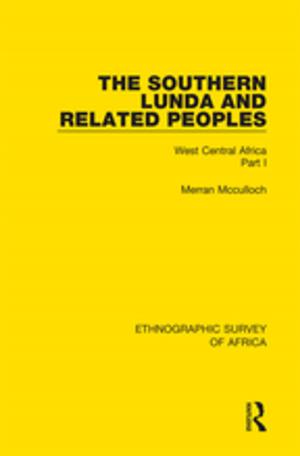Judaism in Contemporary Thought
Traces and Influence
Nonfiction, Religion & Spirituality, Philosophy, Social & Cultural Studies, Social Science| Author: | ISBN: | 9781317811602 | |
| Publisher: | Taylor and Francis | Publication: | April 3, 2014 |
| Imprint: | Routledge | Language: | English |
| Author: | |
| ISBN: | 9781317811602 |
| Publisher: | Taylor and Francis |
| Publication: | April 3, 2014 |
| Imprint: | Routledge |
| Language: | English |
The central aim of this collection is to trace the presence of Jewish tradition in contemporary philosophy. This presence is, on the one hand, undeniable, manifesting itself in manifold allusions and influences – on the other hand, difficult to define, rarely referring to openly revealed Judaic sources.
Following the recent tradition of Lévinas and Derrida, this book tentatively refers to this mode of presence in terms of "traces of Judaism" and the contributors grapple with the following questions: What are these traces and how can we track them down? Is there such a thing as "Jewish difference" that truly makes a difference in philosophy? And if so, how can we define it? The additional working hypothesis, accepted by some and challenged by other contributors, is that Jewish thought draws, explicitly or implicitly, on three main concepts of Jewish theology, creation, revelation and redemption. If this is the case, then the specificity of the Jewish contribution to modern philosophy and the theoretical humanities should be found in – sometimes open, sometimes hidden – fidelity to these three categories.
Offering a new understanding of the relationship between philosophy and theology, this book is an important contribution to the fields of Theology, Philosophy and Jewish Studies.
The central aim of this collection is to trace the presence of Jewish tradition in contemporary philosophy. This presence is, on the one hand, undeniable, manifesting itself in manifold allusions and influences – on the other hand, difficult to define, rarely referring to openly revealed Judaic sources.
Following the recent tradition of Lévinas and Derrida, this book tentatively refers to this mode of presence in terms of "traces of Judaism" and the contributors grapple with the following questions: What are these traces and how can we track them down? Is there such a thing as "Jewish difference" that truly makes a difference in philosophy? And if so, how can we define it? The additional working hypothesis, accepted by some and challenged by other contributors, is that Jewish thought draws, explicitly or implicitly, on three main concepts of Jewish theology, creation, revelation and redemption. If this is the case, then the specificity of the Jewish contribution to modern philosophy and the theoretical humanities should be found in – sometimes open, sometimes hidden – fidelity to these three categories.
Offering a new understanding of the relationship between philosophy and theology, this book is an important contribution to the fields of Theology, Philosophy and Jewish Studies.















